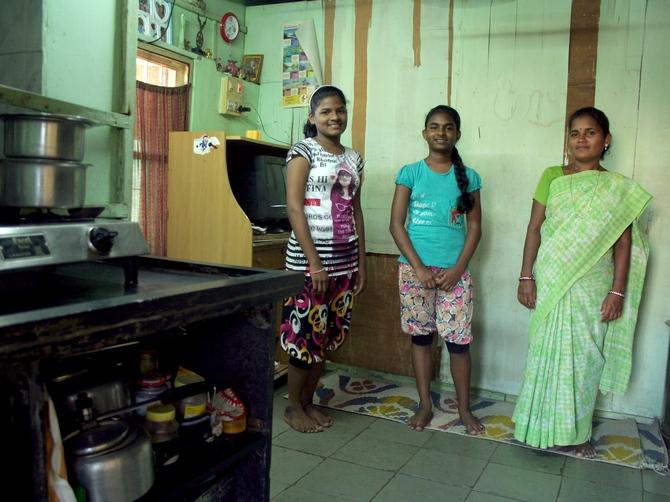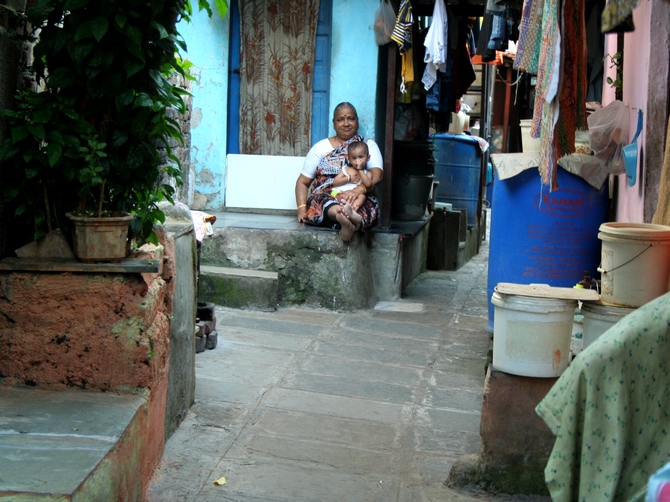 | « Back to article | Print this article |
A mother goes back to school, for her daughters
Jayashree Kanam is waiting for the Class X board examination results. But her story is far from ordinary. Jayashree, 41, hopes education will give her daughters a better life, finds Abhishek Mande Bhot
In a low-cost housing cluster in suburban Mumbai, a narrow iron staircase leads to a room that is home to Jayashree Kanam and her daughters, Sheetal and Shweta.
The 10 foot by 10 foot 'apartment' has a kitchenette, an iron cupboard, a utensil stand and a television. One corner is a bathing area covered by little more than a flimsy curtain.
And stacked up against one wall, half way to the ceiling, are books. Lots and lots of them. Some are covered with brown paper, and almost all are in various stages of being tattered.
These books, all hand-me-downs, have given Jayashree, 41, a sense of purpose. A couple of years ago, after more than 20 years of giving up on her education, she decided it was time to go back to school.
This year she decided to appear for her Class 10 examinations -- along with her daughter Shweta, 15.
Like hundreds of thousands of other students, Jayashree awaits her results.
Swept away by Mumbai's floods
On July 26, 2005, the day Mumbai's annual flooding woes made international headlines, Jayashree's husband Jayant was swept away by a strong current of water and sucked into an open drain as he tried to get back home from work.
"We didn't have mobile phones back then. So there was no way for us to know where he was," she remembers. "We thought he might have gone to someone's house to spend the night since it was raining so heavily. That day I picked up both of them (Sheetal and Shweta), waded through neck-deep water and brought them home."
There was no word from her husband the entire night and the following day.
A local auto rickshaw driver alerted them about a body found in Lokhandwala, the western Mumbai suburb that is about 3 km from their home.
The body was unrecognisable. Jayashree was able to identify her husband by the locket around his neck, and the colour of his shirt. Jayant Kanam was the only person from their locality to die in the flood.
Please click NEXT to continue reading...
A mother goes back to school, for her daughters
Jayashree grew up in a tiny village along Maharashtra's Konkan coast. Her father worked in a Mumbai textile mill, her extended family was into farming back in the village.
Like her two siblings, Jayashree too was made to quit school and became a farmhand.
The few times she visited Mumbai to see her father, she soaked in the city -- the Gateway of India, the museum, the zoo.
"It was all so new," she says. "The zoo had so many animals then. Now there are so few. Everything seemed so huge -- the buildings, the buses -- and everyone seemed to be in a hurry."
Jayashree convinced her father to find her a match from Mumbai.
"I also never liked the four-day wedding ceremonies in my village, so I insisted we get married in Mumbai itself, where everything is wrapped up in a day," she remembers.
On April 18, 1994 Jayashree began her new life in Mumbai. Her husband worked as a car mechanic. She ran the house.
"I wouldn't have thought of going back to school if he was around. There was no need to. We were doing alright," Jayashree says.
Back to school
After her husband's death, Jayashree started working as a cook to support herself and her daughters.
Her day would start at 4.30 am, queuing up for water at the community tap. After she got her daughters ready for school, around 7.30, she would be off to work.
Then Jayashree she found another job at a local anganwadi -- a government initiative that provides health care, counselling and non-formal pre-school education to underprivileged children -- to supplement her meagre income.
At the anganwadi, she looks after 25 children, 2 years to 6 years old. She teaches them letters of the alphabet, and nursery rhymes.
A fresh start
Two years ago, Jayashree decided to make a fresh start.
She had completed her education till Class 8. Her older daughter Sheetal had already completed her Class 10 examinations. Shweta had just finished Class 8.
So Jayashree enrolled herself in a night school.
"It is very difficult," she says. "You cannot just go back to studying after so many years. I had trouble memorising, learning new things. It doesn't get easier when you get older."
It also meant squeezing time out for her studies in her already long day.
"Between the time I complete my cooking jobs and start at the anganwadi, I have some 45 minutes. So I'd study between 9.30 and 10.15 in the morning then head to work," she says.
She would return from work at about 3pm and dive into her books for two hours -- the longest duration in the day she could dedicate for her education -- before getting down to dinner preparations.
After attending night school between 6.30pm and 9.30pm, Jayashree would call it a day close to 11 pm.
It helped that one of her daughters was also appearing for the same examination. Jayashree says it kept her going.
Sheetal also took time out to help her mother.
"I would go to her with doubts in algebra, geometry and English," Jayashree says.
Standing by a dream
While Jayashree was busy with her studies, her sister-in-law helped Shweta with hers.
"I wouldn't have been able to without help from her," Jayashree says.
The daughters say seeing their mother work so hard inspires them too.
Shweta has been selected for Abhyudaya, an initiative by Bharatiya Vidya Bhavan's SP Jain College that adopts talented underprivileged children and grooms them for a better future without uprooting them from their environment.
What will Jayashree do once she passes?
"I would like to continue with my education," she says. "I will try and complete my graduation. Let's see. If I complete my tenth, I will be promoted at the anganwadi. I will get more responsibilities."
The promotion will also mean a raise of Rs 3,000. And that, in the world of the mother and her daughters, is yet another step to a better life.
Top stories we would like you to read!
Click on MORE to see another feature...



